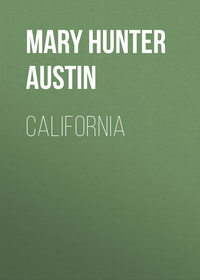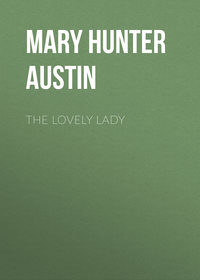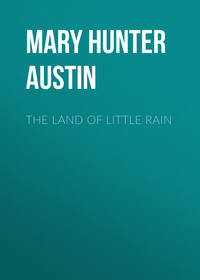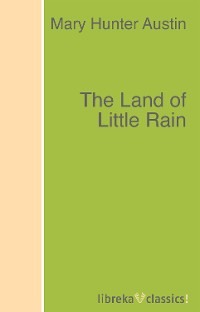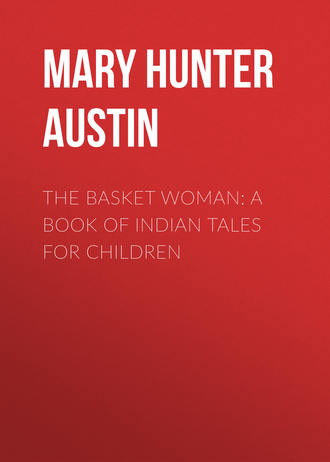 полная версия
полная версияThe Basket Woman: A Book of Indian Tales for Children
Jerry had cause to remember the stranger in the night and fret for him, for the wind came up and began to seek in the cañon, and the snow fell slanting down. It fell three days and nights. All that while the gray veil hung about Jerry's house; now and then the wind would scoop a great lane in it to show how the drifts lay on the heather, then shut in tight and dim with a soft, weary sound, and Jerry, though he worked on the Golden Fortune, could not get the young stranger out of his mind.
When the sun and the frost had made a crust over the snow able to bear up a man, he went over the Pass to Bighorn to inquire if the stranger had come in, though he did not tell at that time, nor until long after, how late it was when the man passed his cabin, how wistfully he turned away, nor what promise was in the air. The snow lay all about the Pass, lightly on the pines, deeply in the hollows, so deeply that a man might lie under it and no one be the wiser. And there it seemed the stranger must be, for at the Bighorn they had not heard of him, but if he were under the snow, there he must lie until the spring thaw. Of whatever happened to him, Jerry saw that he must bear the blame, for, by his own account, from that day the luck vanished from the Golden Fortune; not that the ore dwindled or grew less, but there were no more of the golden specks. With all he could do after that, Jerry could not maintain himself in the cabin on the slope of Rex Monte. So it came about that the door was often shut, and the picks rusted in the tunnel of the Golden Fortune for months together, while Jerry was off earning wages in more prosperous mines.
All his days Jerry could not quite get his mind away from the earlier promise of the mine, and as often as he thought of that he thought of the stranger whom he had sent over the trail on the evening of the storm. Gradually it came into his mind in a confused way that the two things were mysteriously connected, that he had sent away his luck with the stranger into the deep snow. For certainly Jerry held himself accountable, and in that country between Kearsarge and the Coso Hills to be inhospitable is the worst offense.
Every year or so he came back to the mine to work a little, and sometimes it seemed to promise better and sometimes not. Finally, Jerry argued that the luck would not come back to it until he had made good to some other man the damage he had done to one. This set him looking for an opportunity. Jerry mentioned his belief so often that he came at last, as is the way of miners, to accept it as a thing prophesied of old time. Afterward, when he grew old himself, and came to live out his life at the Golden Fortune, he would be always looking along the trail at evening time for passers-by, and never one was allowed to go on who could by any possibility be persuaded to stay the night in Jerry's cabin. Often when there was a wind, and the snow came slanting down, Jerry fancied he heard one shouting in the drift; then he would light a lantern and sally forth into the storm, peering and crying.
About that time, when he went down into the town below Kearsarge once in a month or so for supplies, the people smiled and wagged their heads, but Jerry conceived that they whispered together about the unkindness he had done to the stranger so many years gone, and he grew shyer and went less often among men. So he companioned more with the wild things, and burrowed deeper into the hill. His cabin weathered to a semblance of the stones, rabbits ran in and out at the door, and deer drank at his spring.
From the slope where the cabin stood, the trail, which led up from the town, winding with the winding of the cañon, went over the Pass, and so into a region of high meadows and high, keen peaks, the feeding-ground of deer and mountain sheep. The ravine of Rex Monte was the easiest going from the high valleys to the foothills, where all winter the feed kept green. Every year Jerry marked the trooping of the wild kindred to the foothill pastures when the snow lay heavily on all the higher land, and saw their returning when the spring pressed hard upon the borders of the melting drifts. So, as he grew older and stayed closer by his mine, Jerry learned to look to the furred and feathered folk for news of how the seasons fared, and what was doing on the high ridges. When the grouse and quail went down, it was a sign that the snow had covered the grass and small seed-bearing herbs; the passing of deer – shapely bulks in a mist of cloud – was a portent of deep drifts over the buckthorn and the heather. Lastly, if he saw the light fleeting of the mountain sheep, he looked for wild and bitter work on the crest of Kearsarge and Rex Monte. It was mostly at such times that Jerry heard voices in the storm, and he would go stumbling about with his lantern into the swirl of falling snow, until the wind that played up and down the great cañon, like the draughts in a chimney, made his very bones a-cold. Then he would creep back to drowse by the warmth of his fire and dream that the blue-eyed stranger had come back and brought the luck of the Golden Fortune. So he passed the years until the winter of the Big Snow. It was so called many winters after, for no other like it ever fell on the east slope of Kearsarge.
It came early in the season, following a week of warm weather, when the sky was full of a dry mist that showed ghostly gray against the sun and the moon; great bodies of temperate air moved about the pines with a sound of moaning and distress. The deer, warned by their wild sense, went down before ever a flake fell, and Jerry, watching, shivered in sympathy, recalling that so they had run together, and such a spell of warm weather had gone before a certain snow, years ago before the luck departed from the Golden Fortune. As the fume of the storm closed in about the cabin, and flakes began to form lightly in the middle air, the old man's wits began to fumble among remembrances of the stranger on the trail, and he would hearken for voices. The snow began, then increased, and fell steadily, wet and blinding.
The third night of its falling Jerry waked out of a doze to hear his name shouted, muffled and feebly, through the drift. So it seemed to him, and he made haste to answer it. There was no wind; on the very steep slope where the cabin stood was a knee-deep level, soft and clogging; in the hollows it piled halfway up the pines. Jerry's lantern threw a faint and stifled gleam. There was no further cry, but something struggled on the trail below him; dim, unhuman shapes wrestled in the smother of the snow. Jerry sent them a hail of assurance cut off short by the white wall of the storm.
There was a little sag in the hill-front where the trail turned off to the cabin, and here the moist snow fell in a lake, into which the trail ran like a spit, and was lost. Down this trail at the last fierce end of the storm came the great wild sheep, the bighorn, the heaviest-headed, lightest-footed, winter-proof sheep of the mountains that God shepherds on the high battlements of the hills. Down they came when there was no meadow, nor thicket, nor any smallest twig of heather left uncovered on the highlands, and took the lake of soggy snow by Jerry's cabin in the dark. They had come far under the weight of the great curved horns through the clogging drifts. Here where the trail failed in the white smudge they found no footing, floundered at large, sinking belly-deep where they stood, and not daring to stand lest they sink deeper. If any cry of theirs, hoarse and broken, had reached old Jerry's dreaming, they spent no further breath on it. By something the same sense that made him aware of their need, Jerry understood rather than saw them strain through the falling veil of snow. It was a sharp struggle without sound as they won out of the wet drift to the firmer ground. They went on like shadows pursued by the ghost of a light that wavered with the old man's wavering feet. It was no night for a man to be abroad in, but Jerry plowed on in the drift till he found the work that was cut out for him. There where the snow was deepest, yielding like wool, he found the oldest wether of the flock, sunk to the shoulders, too feeble for the struggle, and still too noble for complaining. How many years had Jerry waited to do a good turn on the trail where he had done his worst: and in all these years he had lost the sense of distinction which should be between man and beast. He put his shoulder under the fore shoulder of the sheep, where he could feel the heart pound with certain fear.
Jerry knew the trail, as he knew the floor of his mine, by the feel of the ground under him, so as he heaved and guided with his shoulder, the great ram grew quieter and lent himself to the effort till they came clear of the swale, and the sweat ran down from Jerry's forehead. But the bighorn could do no more. In the soft fleece of the snow he stood cowed and trembling. The snow came on faster, and wiped out the trail of the flock; he made no motion to go after. Such a death comes to the wild sheep of the mountains often enough: to fail from old age in some sudden storm, to sink in the loose snow and await the quest of the wolf, or the colder mercy of the drift. He turned his back to the storm which began to slant a little with the rising wind, and looked not once at Jerry nor at the hills where he had been bred. But Jerry cast his eye upon the sheep, which was full heavier then than he, and then up at the steep where his cabin stood, remembering that he had nothing there that might serve a sheep for food. Then he bent down again, and by dint of pulling and pushing, and by a dim sense that began to filter through the man's brain to the beast, they made some progress on the trail. They went over broken boulders and floundered in the drifts, where Jerry half carried the sheep and was half borne up and supported by the spread of the great horns. They crossed Pine Creek, which ran dumbly under the snow, housed over by the stream tangle. The flakes hissed softly on Jerry's lantern and struck blindingly on his eyes, but ever as they went the sheep was eased of his labor, grew assured, and carried himself courageously. Finally they came where the storm thinned out, and whole hill-slopes covered with buckthorn and cherry warded off the snow by springy arches, and Jerry drew up to rest under a long-leaved pine while the sheep went on alone, nodding his great horns under the branches of the scrub. He neither lingered nor looked back, and met the new chance of life with as much quietness as the chance of death. Jerry was worn and weary, and there was a singing in his brain. The pine trees broke the wind and shed off the snow in curling wreaths. It seemed to the old man most good to rest, and he drowsed upon his feet.
"If I sleep I shall freeze," he said; and it seemed on the whole a pleasant thing to do. So it went on for a little space; then there came a shape out of the dark, a hand shook him by the shoulder, and a voice called him by name. Then he started out of dreaming as he had started at that other call an hour ago, and it seemed not strange to him, the night, nor the storm, nor the face of the blue-eyed man that shone out of the dark, but whether by the light of his lantern he could not tell. He shook the snow from his shoulders.
"I have expected you long," he said.
"And now I have come," said the stranger and smiled.
"Have you brought the luck again?"
"Come and see," said the man.
Then Jerry took his hand and leaned upon him, and together they went up the trail between the drifts.
"You bear me no ill-will for what I did?" said Jerry.
And the stranger answered, "None."
"I have wished it undone many times," said the old man. "I have tried this night to repay it."
"By what you have done this night I am repaid," said the stranger.
"It was only a sheep."
"It was one of God's creatures," said the man.
So they went on up the trail, and it seemed sometimes to Jerry that he wandered alone in the dark, that he was cold, and his lantern had gone out; and again he would hear the stranger comfort and encourage him. At last they came toward the cabin, and saw the light stream out of the window and the fire leap in the stove. Then Jerry thought of the mine, and that the stranger had brought back the luck again. It seemed that the young man had promised him this, though he could not be sure of that, nor very clear in his mind on any point except that he had come home again. But as he drew near, it seemed a brightness came out of the tunnel of the mine, a warmth and a great light. As he came into it tremblingly, he saw that the light came from the walls, and from the lode at the far end of it, and it was the brightness of pure gold. And Jerry smiled and stretched out his arms to it, making sure that the luck had come again.
After the week of the Big Snow there were people in the town who remembered Jerry, and wondered how he fared. So when the snow had a crust over it, they came up by the windy cañon and sought him in his house, where the door stood open and a charred wick flared feebly in the lamp, and in his mine, where they found him at the far end of the tunnel, and it seemed as if he slept and smiled.
"It is a worthless lode," they said, "but he loved it."
So they took powder and made a blast, and with it a great heap of stones, shutting off the end of the tunnel from the outer air, and so left him with his luck and the Golden Fortune.
THE WHITE-BARKED PINE
THE WHITE-BARKED PINEThe white-barked pine grew on the slope of Kearsarge highest up of all the pines, so high that nothing grew above it but brown tufts of grass and the rosy Sierra primroses that shelter under the edges of broken boulders. The white-barked pines are squat and short, trunks creeping along the rocks, and foliage all matted in a close green thatch by the winter's weight. Snow lies on the slope of Kearsarge eight months in the year, deep and smooth over the pines and the jagged rocks; other months there are great storms of rain, and always a strong wind roaring through the Pass, so that, try as it might, no tree could stand erect on those heights. The white-barked pine stretched its body along the ground, and though it was four hundred years old, it was no thicker than a man's leg, and its young branches of seventy-five or a hundred years were still so supple that one could tie knots in them. It grew near the trail, which here crossed through a gap in the crest of the range and straggled on down the other side of the mountain.
Along this trail went many strange things in their season. Early in the year, before the snow had melted at all on the high places, went a great lumbering bear that had a lair above Big Meadows, going down to the calf-pens and pig-sties of the town at the foot of Kearsarge. He ranged back and forth on these little excursions of fifteen or twenty miles in the hungry season of the year, and sometimes there were hunters on his trail with dogs and guns, but nothing ever came of it. When the trail began to run a rivulet from the drip of melting snow banks, the forest ranger went up the Pass, singing as he went and beating his arms to keep himself warm. Afterwards when the snow water was all drained off, he came back and mended the trail. All through the summer there would be parties of miners and hunters with long strings of pack mules, going over Kearsarge to camp in Big Meadows or on the fork of King's River. Sometimes there were parties of Indians with women and children, making very merry with berries, fish, and deer meat. Nearly always, whatever went over the mountain came back again, and the white pine noticed that the same people came again another season. In four hundred years one has space for observation and reflection. Gradually the pine tree grew into the conviction that the other side of the mountain must be much finer than this.
"Else why," said he, "should so many people go there every year?"
It was very fine, you may be sure, on the white pine's side, but the tree had known it all for so many years, it no longer pleased him. From where he grew he looked down between the ridges on a great winding cañon full of singing trees, with blue lakes like eyes winking between them. He could watch in the open places the white feet of the water on its way to the valley, and from the falls long rainbows of spray blown out as if they were blowing kisses to the white-barked pine. Below all this lay the valley, hollow like a cup, full of fawn-colored and violet mist, and the farms and orchards lay like dregs at the bottom of the cup. Beyond the valley rose other noble ranges with cloud shadows playing all along their slopes.
"It is very tiresome to look at the same things for four hundred years," said the white-barked pine. "If I could only get to the top, now. Do tell me, what is it like on the other side?" he said to the wind.
"Oh!" said the wind, "it rains and snows. There are trees and bushes and blue lakes. It is not at all different from this side."
A deer said the same thing when it slept one night under the thatch of the highest pine. "It is all meadows and hills, only sometimes the grass is not so good there, and again sometimes it is better. It is very much like this."
"I do not believe them," said the pine to himself. "They are simply trying to console me for not realizing my ambition. But I am not a sapling any longer, let me tell you that."
"At least," said a young tree that grew a little farther down, "you are higher up than any of us."
"Of what use is that if I do not get to the top?" said the unhappy pine. "There is a bunch of blue flowers there, I can see it quite plainly just where the trail dips over the ridge. Surely I am as capable of climbing as any blue weed."
"But," said the young pine, "weeds do not have to grow cones."
"Oh, as for cones," cried the tree quite crossly, "the seasons are so short I hardly ever ripen any, and if I do the squirrels get them. I do believe I have not started a seedling these two hundred years. It is no use to talk to me, I shall be happy only when I have seen the other side of the mountain."
It seems what one desires with all one's heart for a long time finally comes to pass in some fashion or other. That very season the white-barked pine went up over Kearsarge to the other side. Early in the summer, when the rosy primroses had just begun to blow beside the drifts that hugged the shade of the boulders, a party of miners went up the trail with a long string of pack mules burdened with picks and shovels, flour and potatoes, and other things that miners use. The last pull up the Kearsarge trail is the hardest, over a steep waste of loose stones that want very little encouragement to go roaring down as an avalanche into the ravine below. The miners shouted, the mules scrambled and panted on the steep, but just as they came by the last of the white-barked pines, one slipped and went rolling over and over on the jagged stones. As happens very frequently when a pack animal falls, the mule was not very much hurt, but the pack saddle was quite ruined.
"We must do the best we can," said one of the men, and he cut down the white-barked pine. He chopped off the boughs, and split the trunk in four pieces to mend the pack. It was a very small tree though it was so old.
"Ah! Ah!" said the tree, "it hurts, but one does not mind that when one is realizing an ambition. Now I shall go to the top." So he went over Kearsarge on mule-back quite like an old traveler.
"Well, we are rid of his complaining," said the pine who stood next to him, "and now I am the highest up of all the pines. I wonder if it is really so much finer on the other side."
His old companion, in four pieces, was swinging down the other side of the mountain, and as he went, he saw high peaks and soddy meadows, long winding cañons with white glancing waters; and heard the chorus of the falls. When it was night the miners lit a fire and loosened up the packs, and after dark, when the wind began to move among the trees and the fire burned low, one of the men threw a piece of the white-barked pine on it.
"Oh! Oh!" cried the pine as the flames caught hold of it, "and is this really the end of all my travels?"
"How that green wood sputters!" said the man; "it is not fit even for firewood."
The next day the wind took up the ash and carried it back over the pass, and dropped it where the chopped boughs lay fainting on the ground.
"Ah, is that you?" they said; "now you can tell us what it is like on the other side."
"How ignorant you are," said the ash of the white-barked pine, "one would know you have never traveled. It is exactly like this side." But he could not hear what they had to say to that, for the wind whirled him away.
NA'ŸANG-WIT'E, THE FIRST RABBIT
DRIVE
NA'ŸANG-WIT'E, THE FIRST RABBIT DRIVEThe Basket Woman was walking over the mesa with the great carrier at her back. Behind her straggled the children and the other women of the campoodie, each with a cone-shaped basket slung between her shoulders. Alan clapped his hands when he saw them coming, and ran out along the path.
"You come see rabbit drive," she said, twinkling her shrewd black eyes under the border of her basket cap. Alan took hold of a fold of her dress as he walked beside her, for he was still a little afraid of the other Indians, but since the time of his going out to see the buzzards making a merry-go-round, he knew he should never be afraid of the Basket Woman again. The other women laughed a great deal as they looked at him, showing their white teeth and putting back the black coarse hair out of their eyes, and Alan felt that the things they said to each other were about him, though they could hardly have been unpleasant with so much smiling. Now he could see the men swarm out of the huts under the hill, all afoot but a dozen of the old men, who rode small kicking ponies at a tremendous pace, digging their heels into the horses' ribs. They passed up the mesa in a blur of golden dust; westward they dwindled to a speck, something ran between them from man to man, now thick like a cord, then shaken out and vanishing in air. Then the riders dropped from their horses and fumbled on the ground. Alan plucked at the Basket Woman's dress.
"Tell me what it is they do," he said.
"It is the net which they set with forked stakes of willow," answered the Basket Woman. Now the young men and the middle-aged began to form a line across the mesa, standing three man's lengths apart in the sage. Some of them were armed with guns and others had only clubs; all were merry, laughing and calling to one another. They began to move forward evenly with a marching movement, beating the brush as they went. Presently up popped a rabbit from the sage and ran before them in long flying leaps; far down the line another bounded from a stony wash, his lean flanks turned broadside to the sun.
Then the hunters broke into shouts of laughter and clapping, then one began to sing and the song passed from man to man along the line; then the men crouched a little as Indians do in singing, then their bodies swayed and they stamped with each staccato note as they moved forward. Rabbits sprang up in the scrub and went before them like the wind, and as each one leaped into view and laid back his ears in flight, the cries and laughter grew and the singing rose louder. The wind blew it back to the women and children straggling far behind, who took it up, and the burden of it was this, —

E – ya – ha hi, E – ya, E – ya – hi!
But every man sang it for himself, beginning when he liked and leaving off, and when a rabbit started up under foot or one over-leaped himself and went sprawling to the sand the refrain broke out again, but the words, when there were any, seemed not to have anything to do with the hunt, and sounded to Alan like a game.
"He-yah-hi, hi! he has it; he has it, he has the white, he has it!"
"Na'ÿang-wit'e!" chuckled the Basket Woman. "Na'ÿang-wit'e, na'ÿang-wit'e! It is as it was of old time, look now and you shall see."
Alan looked at the hunters again, and whether it was because of the blown dust of the mesa, or the quiver of heat that rose up from the sand, or because the Basket Woman had laid her hand upon him, he saw that they were not as they had been a moment since. Now they wore no hats and were naked from the waist up, clothed below with deerskin garments. Quivers of the skin of cougars with the tails hanging down were slung between their shoulders, and the arrows in them were pointed with tips of obsidian and winged with eagle feathers. Every man carried his bow or his spear in his hand. Bright beads and bits of many-colored shell hung and glittered in their hair. Rabbits went before them like grasshoppers for number, and the song and the shouting were fierce and wild. "But what is it all about?" asked Alan.


